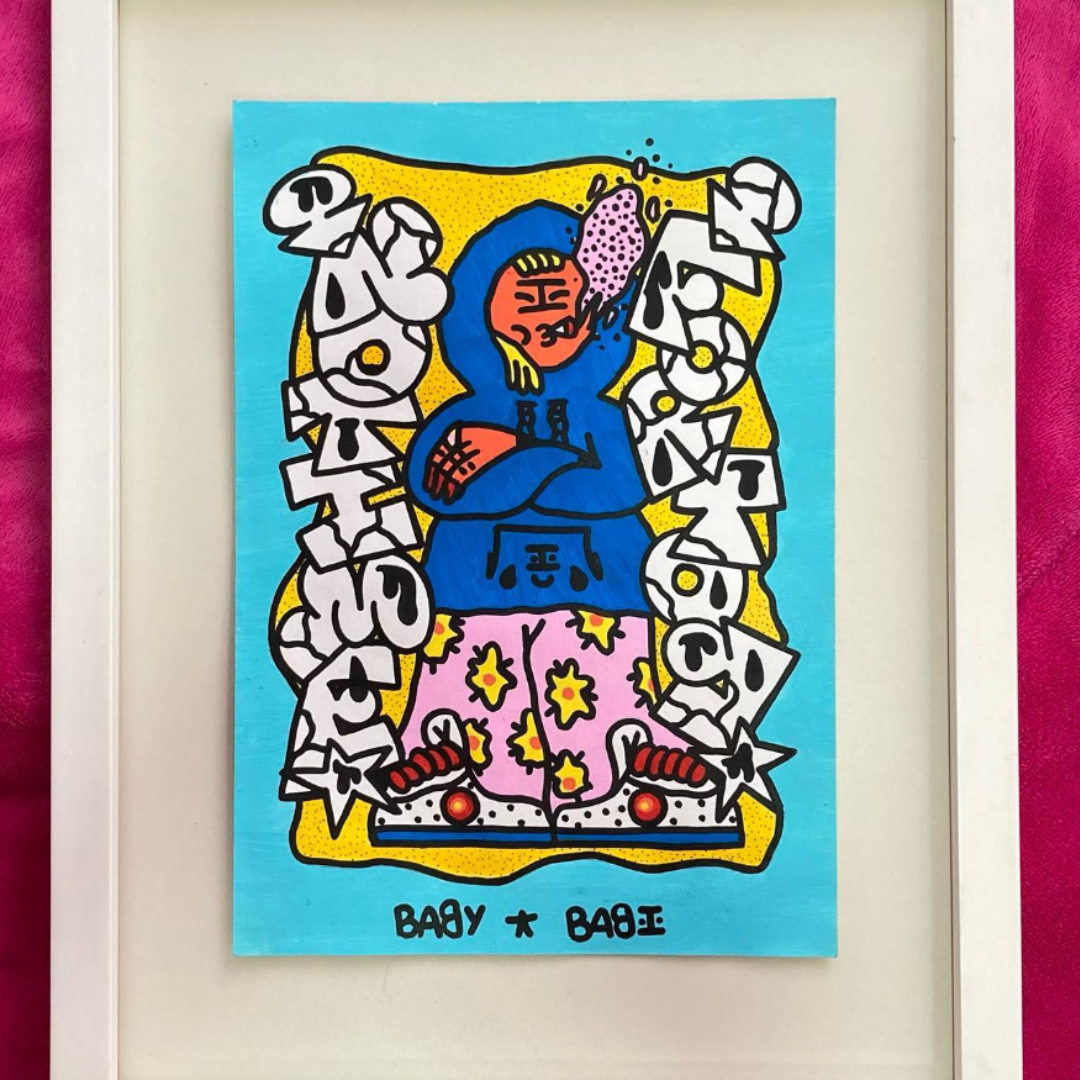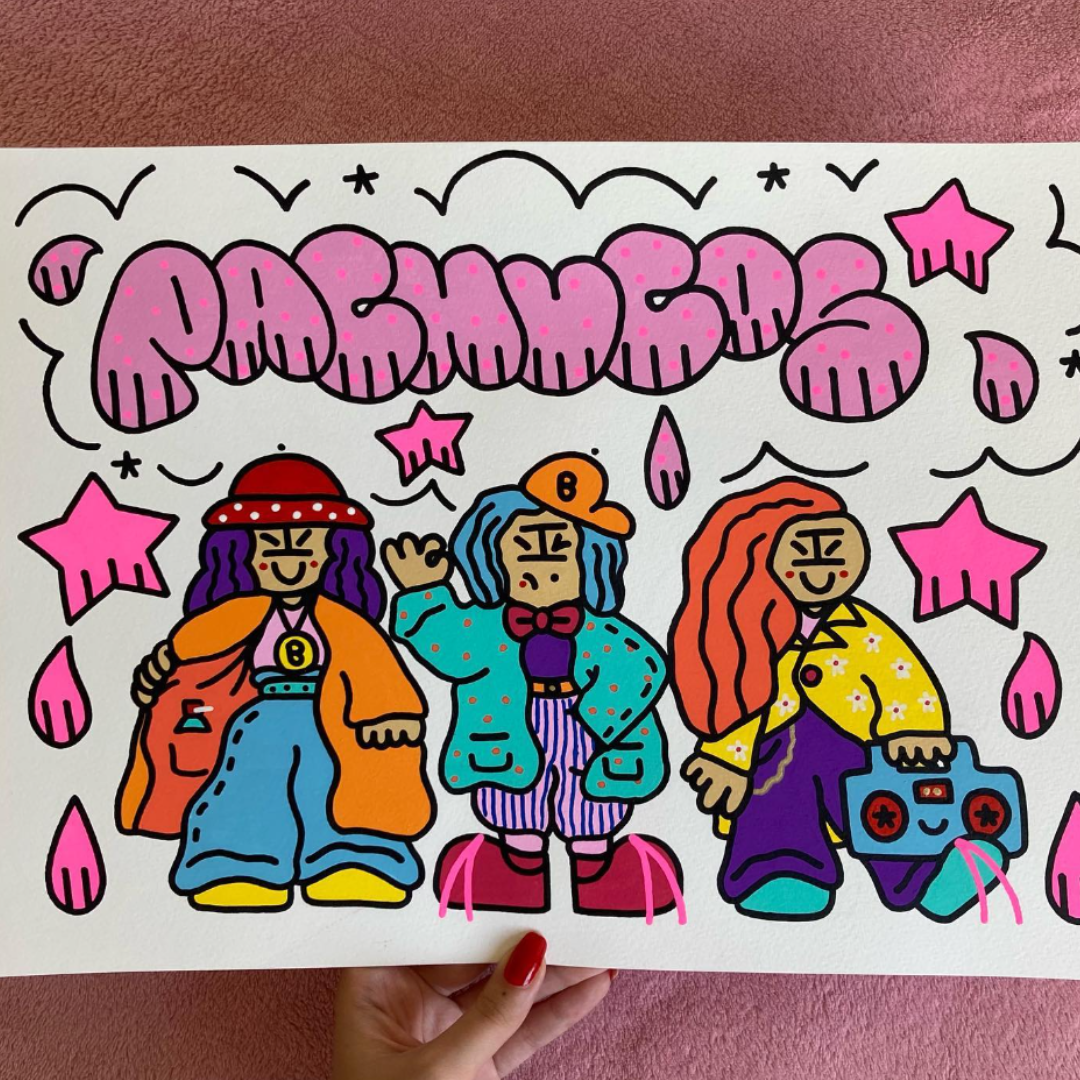Get to know Baby Babi: Curitiba’s dopest new gen graffiti girl (Em Inglês e Português)
Interview translated by Agatha Saldanha, Baile Funk Culture co-founder and London based visual artist from São Paulo
I first fell in love with Baby Babi’s art in 2022 and she’s been my #1 style inspiration ever since. I love everything about her work, from the throw up bubble style to her characters and messages with attitude, her hard lines and block colour (in all my favourite shades), and most of all, her mischievous energy.
Finding her on Instagram, I ordered her artwork from Brazil to London in October 2022, arriving on the day President Lula was elected in Brazil and the day my girl friends threw their first ever Baile Funk Culture party, now one of the top Brazilian Funk events in London. That was a magic day. Ever since, I’ve had two of her pieces up in my living room and she is a constant source of divine inspiration to me.
Fast forward two years, and my dream came true: I interviewed Babi in Sao Paulo, and bought another piece of her art. And Agatha from Baile Funk Culture, who I spray with in London, has translated the interview between me and Baby Babi! A beautiful full-circle moment for sure.
Sitting over a caiprinha on the street in Tatuape, Sao Paulo, we had a giggly and very excitable evening together with my bestie and painting partner Vanessa, and Carol Calor, another incredible writer from Sao Paulo who was translating my interview questions into Portuguese so Babi could express herself in full. We spoke about her creative practice, rebel art, love of cartoons, and what it means to be a female graffiti artist in Brazil.
What inspired you to pick up a spray can?
Rebellion. Rebellion inspired me to pick up a spray can because I needed to express myself somehow, and this is the way I found to do so. Ever since I discovered it, I haven't been able to stop because it's part of everything. If I paint my pictures, my characters, it's all connected to graffiti. So, that first contact was very important; otherwise, I wouldn't do what I do today.
O que inspirou você a pegar uma lata de spray?
A rebeldia. A rebeldia me inspirou a pegar uma lata de spray porque eu precisava me expressar de alguma maneira, e essa foi essa a maneira que eu encontrei. Desde que eu conheci isso eu nunca mais consegui parar porque faz parte disso tudo. Então se eu pinto meus quadros, meus personagens, tem tudo a ver com o grafite. Então, enfim, o primeiro contato foi muito importante se não eu não faria o que eu faço hoje.
What is your creative process?
Usually, it's when there's a very strong emotion surfacing. Like, when I'm really angry and need to get that feeling out of me somehow, I grab paper and start scribbling, and ideas start flowing. Always with music as well. I can't do anything without music being played. So, my creative process is basically like this. When there's a strong emotion, whether it's happiness, anger, sadness, or anguish, I always pay attention to that and start to create.
Qual é o seu processo criativo?
Geralmente, quando tem algum sentimento muito forte sobressaindo. Ou eu estou com muita raiva e preciso tirar esse sentimento de dentro de mim de alguma maneira, então eu pego o papel e começo a riscar e as ideias começam a surgir, mas também sempre com música. Eu não consigo fazer nada sem música. Então o meu processo criativo é basicamente isso assim, quando tem um sentimento muito acumulado seja de felicidade, raiva, tristeza, angústia, e sempre acompanhado de alguma música e eu sempre presto atenção nisso também e começo a fazer minhas criações.
Show me your favourite artwork and why.
This is my favourite piece because I participated in my first group exhibition, and it was a very important thing because it was in São Paulo, and I live in Curitiba, where these things don't happen like that. My city is in south Brazil and it's not a big city like São Paulo. When I received the invitation, I was very happy and thinking, “What am I going to create to show people my style and who I am?” And, well, there were a lot of people there who already knew me, you know.
I had this idea and it was very natural because I wanted to create a female character, and her farting because here, farting is like not caring, like 'whatever, fuck it,' you know?
Carol: Like, I'm human.
Because, well, the hip-hop scene itself is still very sexist, right? So, only women really know what we go through here. So it was my moment to show that I am a woman, fuck it, this is my style, and that's it. I really like this piece, It's very important to me.
Carol "This is my style, fuck it haha" (humming)
Me mostre a sua obra de arte favorita e por que?
Esse é o meu trabalho preferido porque eu participei da minha primeira exposição coletiva e foi uma coisa bem importante para mim porque foi em São Paulo, e eu moro em Curitiba, e lá em Curitiba não acontece essas coisas assim. Minha cidade fica no sul e não é uma cidade grande como São Paulo. Quando recebi o convite, fiquei muito feliz e pensando, “O que eu vou criar para poder mostrar pra galera o meu estilo, quem eu sou?”. E enfim, tinha muita gente ali que já me conhecia também, sabe.
Eu tive essa ideia e foi super natural porque eu quis fazer uma personagem mulher, e ela peidando porque aqui peidar é você não se importar, tipo assim “tanto faz, foda-se”, sabe?
Carol: Tipo assim, sou um ser humano.
Porque assim, a cena do hip-hop em si é ainda muito machista, né. Então só as mulheres mesmo sabem o que a gente passa aqui. Então foi o meu momento de mostrar que eu sou mulher mesmo, foda-se, esse é meu estilo e é isso. Eu gosto muito desse trabalho, eu acho muito importante pra mim.
"Esse é meu estilo, que se fodaaa haha" (cantarolando)
How is it to be a woman in the graffiti scene in Brazil?
Yeah, so, as with everything in life, there are the good and bad sides, right? It's complicated by the prejudice we face. Many people here in Brazil don't see art as culture, like in other countries where consuming art is more common or even having a more open mindset about art in general, because graffiti is art and an expression, too. Graffiti is somewhat marginalised. Being a female artist is a bit complicated due to these issues. But it is very cool because we can have, somehow, more attention. It's really cool because most people really like Brazil. So when people find out there's a woman from Brazil with a cool style, they're like, "Wow, that's awesome! I love Brazil, love your style." Anyway, it has its challenges, like everything in life, but I love being a Brazilian artist.
Como sempre foi o cenário do grafite feminino no Brasil?
Carol- Como é ser uma mulher na cena do grafite no Brasil?
É, então, como tudo na vida tem o lado bom e ruim, né. É um pouco complicado o preconceito que a gente passa porque muitas pessoas aqui no Brasil não levam a arte como cultura como em outros países de consumir arte. E enfim até de ter a mente um pouco mais aberta sobre arte no geral, porque o grafite é uma arte, é uma expressão também. E o grafite é uma coisa meio marginalizada, então ser uma mulher artista é um pouco complicado por essas questões. Mas eu acho muito legal porque a gente consegue ter um destaque digamos “um pouco maior”. Acho muito legal porque a maioria das pessoas gostam muito do Brasil. Então quando a galera descobre que tem uma mulher do Brasil e que tem um estilo legal eles ficam assim “nossa, muito massa, eu amo o Brasil, amo seu estilo”. Enfim tem seus desafios como tudo na vida mas eu amo ser uma artista brasileira.
What is your favourite thing about Brazilian graffiti culture?
My favourite thing here is the style. I really like it. Because it's a mix of elements and letters, you know? And it seems like here, we don't really care about being stuck in some style, it's very diverse. There's pixação, Throw-up, Tag. There are thousands of things, and I think that's really cool. It's never just one style, you know. I think that's my favourite part. Everything's kind of mixed together.
Qual é a sua coisa favorita sobre a cultura do grafite no Brasil? A minha coisa favorita daqui é o estilo. Eu gosto muito disso! Porque é uma mistura de coisas e escritas, sabe? e parece que aqui a gente meio que realmente não liga para essas coisas de, como eu posso dizer, ficar presa em algum estilo, é muito diversificado. Tem a Pixação, tem o throw up, tem a Tag, enfim tem milhares de coisas
e eu acho isso muito legal porque nunca é apenas uma cena, sabe? Acho que essa é a minha parte favorita. Tá tudo meio que junto e misturado.
Who is your favourite graffiti artist in Brazil?
All women who do things and take risks inspire me in a certain way. But the women who inspired me to start and continue are: yanka, dune, laia, yubia, fluffy, I can name several. and certainly the Gemeos are my biggest reference too! And my stepmother is an artist because she is a writer. She is a very important person in my life because she encouraged me to be who I am. She is a great artist too, of course not in graffiti, but writing is still an art, and she is also Brazilian, a super strong woman who goes after what she wants, doesn't care what others think, and doesn't depend on a man to do her things. She is the best of all.
quem é sua grafiteira favorita no brasil?
Todas as mulheres que fazem coisas e correm riscos me inspiram de uma certa maneira. Mas as mulheres que me inspiraram a começar e continuar são: yanka, dune, laia, yubia, fluffy… posso citar vários nomes! e com certeza os Gemeos são minha maior referência também! E minha madrasta é uma artista porque ela é escritora. Ela é uma pessoa muito importante na minha vida porque ela me encorajou a ser quem eu sou, enfim ela e uma “baita” de uma artista também, claro que não do grafite, mas a escrita não deixa de ser uma arte, e ela também é brasileira, uma mulher super forte, que vai atrás das coisas dela, não liga para o que os outros pensam ninguém, não fica dependendo de homem para fazer as coisas dela. Ela é a melhor de todas.
Anything else for the interview you want to add?
I want to make it clear that if you're a woman and you feel a little scared to do things just because you're afraid of being judged, because we know that in this world we live in, everything is very difficult and cruel, to really be who we are. There's a lot of prejudice. WHAT I HAVE to say is, go for it, do what you feel inside your spirit, what touches your heart, don't be afraid of anyone, of anyone's judgement, just be yourself and you will be able to conquer the whole world. THAT'S IT.
Gostaria de adicionar mais alguma coisa na entrevista?
Eu quero deixar registrado que se você é mulher e se sente um pouco com medo de fazer as coisas só porque está com medo de ser julgada porque a gente sabe que nesse mundo que a gente vive tudo é muito difícil e muito cruel a gente conseguir realmente ser quem a gente é, tem muito preconceito. O QUE EU TENHO para dizer é se joga, faça o que você sente dentro do seu espiritual, que é o que toca no seu coração para você fazer, não tenha medo de ninguém, do julgamento de ninguém, só seja você que você vai conseguir conquistar o mundo inteiro. É ISSO.



























